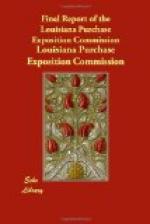The exposition management was not spared. More than one speaker waxed eloquent over what he declared was wanton waste of the greatest amount of money ever intrusted to an exposition management, which wanton waste had made the Exposition Company bankrupt and again at the doors of the Treasury begging for funds. Those working against the bill triumphantly quoted the following clause, which is section 24 of the original bill, and which authorized the creation of the exposition. It reads:
“That nothing in this act shall be so construed as to create any liability of the United States, direct or indirect, for any debt or obligation incurred, nor for any claim for aid or pecuniary assistance from Congress or the United States in support or liquidation of the debts or obligations created by said Commission.”
After postponement and delays,
the bill of the 11th of February
passed the House 172 to 115—57
majority. On the 15th it went
back to the Senate and was
promptly passed.
The whole amount appropriated for the use of the board of lady managers was placed in their custody by the Secretary of the Treasury, and its expenditure has been most carefully guarded. With this money at its command, it has always stood ready to assist the Exposition Company in every way possible, and the report of the treasurer will show that the disbursements have been made in a manner befitting the greatest of all world’s fairs.
Respectfully submitted.
C.B. BUCHWALTER.
MARY PHELPS MONTGOMERY.
SALLIE D. COLEMAN.
All of the members of the board of lady managers were inspired at an early period of their official existence with a desire to accomplish something that would be of lasting benefit to the interests of women, and one of the first committees to be appointed by the president was on woman’s work, which seemed to offer great scope for the development of earnest efforts and good judgment. They realized that upon their activity would greatly depend the extent to which women in this country and of the world at large would participate, directly or indirectly, in making this exposition the most beneficent for women that had been, or could be, attained in any age or ages.




